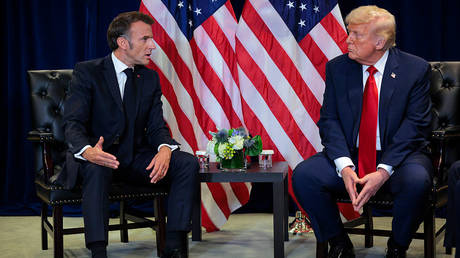
Beijing and its partners reportedly hope to challenge the US’ dominance of the global communications infrastructure
China’s largest telecom firms are working on a massive undersea telecommunications cable network aimed at challenging the US’ dominance in operating global internet infrastructure, four people involved with the project told Reuters on Thursday.
China Telecom, China Mobile Limited and China Unicom are in the planning stages of what is expected to be a $500-million undersea fiber optic project connecting Asia with the Middle East and Europe, the sources said. The sprawling network, known as EMA (Europe-Middle East-Asia), is reportedly intended to compete with another cable system currently under construction by US firm SubCom LLC called SeaMeWe-6 (Southeast Asia-Middle East-Western Europe-6).
Chinese firm HMN Tech (formerly Huawei Marine Networks) was initially selected in 2020 to manufacture the cable for SeaMeWe-6 by a consortium that included the Chinese telecoms now working on EMA. However, a sustained US pressure campaign that included millions of dollars in “training grants” to foreign telecoms in return for switching their votes ultimately pushed the contract to HMN’s US competitor last year, despite significantly higher costs.
The three Chinese telecoms have reportedly signed agreements with telecoms in France, Pakistan, Egypt, and Saudi Arabia, with further deals in the works elsewhere in Asia, Africa and the Middle East. The consortium hopes to bring EMA online by the end of 2025, the sources told Reuters.
The advantages of such a project for China are obvious, one source told Reuters – a faster connection between China, Hong Kong, and the rest of the world not under US control gives Beijing an insurance policy should they be cut off from US-controlled networks. Washington has been campaigning for years to convince allies to exclude Chinese companies from future infrastructure projects.
However, Reuters’ sources said they fear the plan presages a growing division of global internet infrastructure into what a researcher for military-industrial think tank RAND Corporation described as “a US-led internet and a Chinese-led internet ecosystem.”
“The more the US and Chinese disengage from each other in the information technology domain, the more difficult it becomes to carry out global commerce and basic functions,” RAND’s Timothy Heath told Reuters, warning that forcing third countries to choose between the two “sides” would make technologies like GPS satellites and online banking much less reliable.
Antonia Hmaidi, an analyst with the Mercator Institute for China Studies, agreed that splitting global internet traffic between two superpowers would significantly increase the likelihood of those superpowers manipulating and spying on data, with a general decline in quality and quantity of service until “suddenly the whole fabric of the internet doesn’t work as it was intended.”




